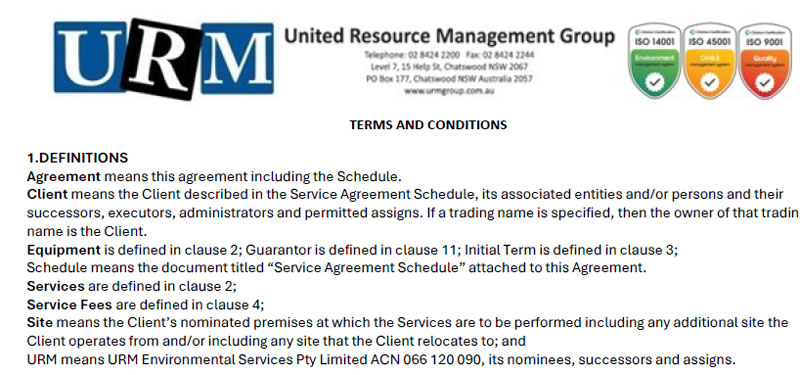What a Load of Rubbish!
https://uploads.prod01.sydney.platformos.com/instances/647/assets/modules/homepage/webapp_uploads/blog/images/thisisrubbish1754621912388-1754621914299.jpg
(Yes, that’s URM’s slogan - but it also sums up my experience.)
Thinking of signing a waste contract? Read this first.
This post reflects my personal views and experiences as a small business owner dealing with a waste management contract.
Notice to all hospitality businesses, please take care before signing a contract with URM.
In October 2017, the ACCC published a media release stating that the Federal Court of Australia had ruled against JJ Richards, a waste management company, finding that eight terms in its standard contract were unfair.
At the time, ACCC Deputy Chair Dr Michael Schaper said: “This is the first court action by the ACCC to enforce new laws that protect small businesses from unfair contract terms.”
The terms found to be unfair in that case included:
- Binding customers to subsequent contracts unless cancelled within 30 days of the term ending
- Allowing unilateral price increases
- Removing liability when performance is “prevented or hindered in any way”
- Charging for services not rendered, even if outside the customer’s control
- Granting exclusive rights to remove waste from the premises
- Suspending service but still charging if payment is late
- Creating an unlimited indemnity in the company’s favour
- Preventing contract termination if payments are outstanding, and continuing to charge equipment rental after termination
In my opinion, when reviewing URM’s current terms and conditions in 2025, I noticed clauses that, in my view, are similar in nature to all eight of these examples from the JJ Richards case.
✅ 1. Binding customers to subsequent contracts unless cancelled within 30 days of the term ending
- Clause 3(c): The agreement automatically renews for 12-month periods unless the customer gives written notice between 120 and 30 days before expiry.
- Clause 11(a) (for consumers/small businesses): If URM fails to notify the renewal window, the customer may terminate with 90 days’ notice.
✅ 2. Allowing unilateral price increases
- Clause 4(d–e): URM may vary service fees due to external cost increases or legislative changes, with 30 days’ written notice. The variation is automatic.
- No reciprocal right for the customer to reject or renegotiate.
✅ 3. Removing liability when performance is “prevented or hindered in any way”
- Clause 5(i): URM excludes liability for indirect, consequential, or economic loss.
- Clause 5(h): All implied warranties are excluded “so far as the law permits.”
- Clause 5(f): Indemnity applies even for defects unless caused by URM’s gross negligence.
✅ 4. Charging for services not rendered, even if outside the customer’s control
- Clause 4(h): If URM is unable to perform services due to reasons within the customer’s control, the customer must still pay.
- This could include missed collections due to access issues or overweight bins.
✅ 5. Granting exclusive rights to remove waste from the premises
- Clause 2(c): The customer relinquishes all proprietary rights in waste collected.
- Clause 18(b): URM reserves the right not to empty bins not provided by URM—effectively granting exclusivity.
✅ 6. Suspending service but still charging if payment is late
- Clause 8: URM may suspend services if the customer fails to comply with any provision, including late payment.
- No obligation to resume service promptly or waive fees during suspension.
✅ 7. Creating an unlimited indemnity in the company’s favour
- Clause 5(i): The customer indemnifies URM and its personnel against any loss or damage, including injury or death, unless caused by URM’s gross negligence.
- Clause 5(j): Additional indemnity for hazardous waste.
- No cap on liability; broad and one-sided.
✅ 8. Preventing contract termination if payments are outstanding, and continuing to charge equipment rental after termination
- Clause 9(e): If the customer terminates outside the permitted mechanism, they must pay:
- All outstanding fees
- 40% of remaining term fees (30% for small businesses under Clause 11)
- All incentives received
- Clause 9(i): If equipment isn’t returned, the agreement continues month-to-month and URM may keep charging rental.
I find it concerning that, eight years after that Federal Court ruling, similar clauses remain in contracts in the waste industry.
From my personal experience, communicating with URM about ending my agreement was lengthy and difficult. Over the course of more than 40 emails, the company maintained that I was required to pay a termination fee, which I felt was excessive. This left me with the impression that exiting their contracts can be costly and challenging for small businesses.
My advice: If you are considering signing a contract with any waste management provider, read their terms and conditions very carefully. Compare them to the clauses in the 2017 JJ Richards case, and seek independent advice before committing.
Doing Rounds of The Kitchen Table
We hope you have enjoyed this week's fresh serve of news from the Catering and Restaurant Industry.
SCK will keep you up-to-date with the latest in Catering Equipment & Restaurant Equipment, Food Trends & Business Tips from around the web.
Let us do the hard work and source the right equipment for your Restaurant or Commercial Kitchen
Our goal at SCK is to sell you products that add value to your business.
We power your kitchen!
Sydney Commercial Kitchenshttps://uploads.prod01.sydney.platformos.com/instances/647/assets/modules/homepage/images/sck.svg?updated=1742991145
